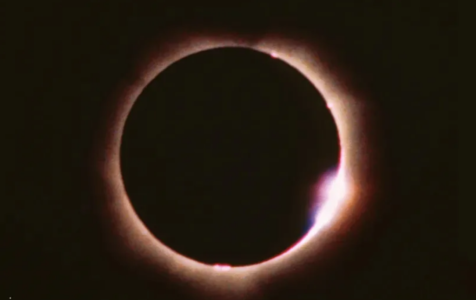Hadith on Solar Eclipse and dua during Eclipse
In Islamic terms, Eclipse is called Kusuf. The words Kusūf كسوف and Khusūf خسوف are both interchangeable terms that linguistically denote the disappearance of light. Some scholars have mentioned that the former relates to the partial disappearance of light whereas the latter relates to the complete disappearance of light. According to the Islamic terminology, both terms are used to describe the solar and lunar eclipse.

Hadith on Solar Eclipse
Narrated Al-Mughira bin Shu`ba:
“The sun eclipsed in the lifetime of Allah’s Messenger (ﷺ) on the day when (his son) Ibrahim died. So the people said that the sun had eclipsed because of the death of Ibrahim. Allah’s Messenger (ﷺ) said, “The sun and the moon do not eclipse because of the death or life (i.e. birth) of someone. When you see the eclipse pray and invoke Allah.”
حَدَّثَنَا عَبْدُ اللَّهِ بْنُ مُحَمَّدٍ، قَالَ حَدَّثَنَا هَاشِمُ بْنُ الْقَاسِمِ، قَالَ حَدَّثَنَا شَيْبَانُ أَبُو مُعَاوِيَةَ، عَنْ زِيَادِ بْنِ عِلاَقَةَ، عَنِ الْمُغِيرَةِ بْنِ شُعْبَةَ، قَالَ كَسَفَتِ الشَّمْسُ عَلَى عَهْدِ رَسُولِ اللَّهِ صلى الله عليه وسلم يَوْمَ مَاتَ إِبْرَاهِيمُ، فَقَالَ النَّاسُ كَسَفَتِ الشَّمْسُ لِمَوْتِ إِبْرَاهِيمَ. فَقَالَ رَسُولُ اللَّهِ صلى الله عليه وسلم “ إِنَّ الشَّمْسَ وَالْقَمَرَ لاَ يَنْكَسِفَانِ لِمَوْتِ أَحَدٍ وَلاَ لِحَيَاتِهِ، فَإِذَا رَأَيْتُمْ فَصَلُّوا وَادْعُوا اللَّهَ ”.
Solar Eclipse salah
The salah of solar eclipse is masnun in the eyes of most of the ulama (Scholars).
- The Hanafis offer two raka’at with the congregation without a sermon.The salah of lunar eclipse is also two raka’at but not in a congregational form Everyone offers it by himself.
- Imam Shafi hold that both these salah are offered with a congregation and a sermon is also delivered.
Hadith on Salah of Solar Eclipse
‘A’isha said there was an eclipse of the sun in the time of God’s Messenger, and he sent one to summon the people to congregational prayer. He then went forward and prayed two rak’as in which he bowed four times and prostrated himself four times. ‘A’isha said, “I never performed a bow or a prostration which was longer than it.” (Bukhari and Muslim.)
عَنْ عَائِشَةَ رَضِيَ اللَّهُ عَنْهَا قَالَتْ: إِنَّ الشَّمْسَ خَسَفَتْ عَلَى عَهْدِ رَسُولِ اللَّهِ صَلَّى اللَّهُ عَلَيْهِ وَسَلَّمَ فَبَعَثَ مُنَادِيًا: الصَّلَاةُ جَامِعَةٌ فَتقدم فصلى أَربع رَكْعَات وَفِي رَكْعَتَيْنِ وَأَرْبع سَجدَات. قَالَت عَائِشَة: مَا رَكَعْتُ رُكُوعًا قَطُّ وَلَا سَجَدْتُ سُجُودًا قطّ كَانَ أطول مِنْهُ
| مُتَّفق عَلَيْهِ (الألباني) | حكم : |
| Reference | : Mishkat al-Masabih 1480 |
How many Rakat in Eclipse prayer, salat al Kusuf
There is also a difference of opinion regarding the method of performing Ṣalāh al-Kusūf and the
number of bowing therein.
- According to Imam Abū Ḥanīfah, Ṣalāh al-Kusūf is two Rakʿah with one Rukūʿ in each Rakʿah,
similar to Ṣalāh al-Fajr. - According to Imam Mālik, Imam Aḥmad, Imam Shāfiʿī, Imam Bukhārī, Layth ibn Saʿd, Abū
Thawr and others, Ṣalāh al-Kusūf is two Rakʿah with two Rukūʿ in each Rakʿah and two
Qiyām and two recitals of Sūrah Fātiḥah. According to Muḥammad ibn Salamah al-Mālikī,
Sūrah Fātiḥah will not be repeated.
Eclipse at the time of Prophet Sallalahu alaihe wa sallam
‘Abdallah b. ‘Abbas said:
There was an eclipse of the sun in the time of God’s Messenger and he prayed accompanied by the people. He stood for a long time, about as long as it would take to recite Sura al- Baqara;(Al-Qur’an; 1) then he bowed for a long time; then he raised his head and stood for a long time; but it was less than the first time; then he bowed for a long time, but it was less than the first bowing; then he raised his head; then he prostrated himself; then he stood for a long time, but it was less than the first time ;
then he bowed for a long time, but it was less than the first bowing; then he raised his head and stood for a long time, but it was less than the first time; then he bowed for a long time, but it was less than the first bowing; then he raised his head; then he prostrated himself; then he departed, and the sun had become bright.
He said, “The sun and the moon are two of God’s signs; they are not eclipsed on account of anyone’s death or on account of anyone’s birth; (1)so when you see that, make mention of God.”
«إِنَّ الشَّمْسَ وَالْقَمَرَ آيَتَانِ مِنْ آيَاتِ اللَّهِ لَا يَخْسِفَانِ لِمَوْتِ أَحَدٍ وَلَا لِحَيَاتِهِ فَإِذَا رَأَيْتُمْ ذَلِكَ فَاذْكُرُوا اللَّهَ» .
The people said, “Messenger of God, we saw you reach out to something while you were standing here, then we saw you move back.” He replied,
«إِنِّي أريت الْجنَّة فتناولت عُنْقُودًا وَلَوْ أَخَذْتُهُ لَأَكَلْتُمْ مِنْهُ مَا بَقِيَتِ الدُّنْيَا وأريت النَّار فَلم أر منْظرًا كَالْيَوْمِ قَطُّ أَفْظَعَ وَرَأَيْتُ أَكْثَرَ أَهْلِهَا النِّسَاءَ»
“I saw paradise and reached out to a bunch of its grapes; and had I taken it you would have eaten of it as long as the world endures. I also saw hell. No such abominable sight have I ever seen as that which I saw today; and I observed that most of its inhabitants were women.”
They asked why that was and he replied that it was for their ingratitude (bi-kufrihinna). He was asked whether they disbelieved in God (2 ) and replied,
يَكْفُرْنَ الْعَشِيرَ وَيَكْفُرْنَ الْإِحْسَانَ لَو أَحْسَنت إِلَى أحداهن الدَّهْر كُله ثُمَّ رَأَتْ مِنْكَ شَيْئًا قَالَتْ: مَا رَأَيْتُ مِنْك خيرا قطّ “
“They are ungrateful to their husbands and they are ungrateful for kindness. If you were to treat one of them kindly for ever and she later saw some defect in you, she would say she had never seen any good in you.”
1. Literally, life.
2. The word kufr means both ingratitude and unbelief, which explains why the remark was misunderstood. (Bukhari and Muslim.)
Dua during Eclipse
‘Auf b. Malik said that he stood up to pray along with God’s Messenger and that when he bowed he paused about as long as it would take to recite Sura al-Baqara (Al-Qur’an; 2) and said while bowing, “Glory be to the Possessor of greatness, the kingdom, grandeur and majesty.” Nasa’i transmitted it.
عَن عَوْف بن مَالك قَالَ: قُمْتُ مَعَ رَسُولِ اللَّهِ صَلَّى اللَّهُ عَلَيْهِ وَسَلَّمَ فَلَمَّا رَكَعَ مَكَثَ قَدْرَ سُورَةِ الْبَقَرَةِ وَيَقُولُ فِي رُكُوعِهِ: «سُبْحَانَ ذِي الْجَبَرُوتِ والملكوت والكبرياء وَالْعَظَمَة» . رَوَاهُ النَّسَائِيّ
| صَحِيح (الألباني) |

Hadith on Solar Eclipse and dua during Eclipse
Prophet’s condition at Eclipse (Sallalahu alaihe wa sallam)
Abu Musa said:
There was an eclipse of the sun, and the Prophet got up in trepidation fearing that the last hour fiad come. He then went to the mosque and prayed, standing, bowing and prostrating himself longer than I had ever seen him do. He then said, “These signs which God sends do not come on account of anyone’s death or on account of his birth, but God produces dread in His servants by means of them. So when you see anything of that nature, apply yourselves to making mention of Him, supplication of Him and asking pardon of Him.” (Bukhari and Muslim.mishkat 1484)
What to do during Eclipse
Recommended actions during an eclipse; they include:
- Ṣalāh in congregation in a Masjid and lengthening the prostration therein.
- Giving charity.
- Seeking Allah’s protection from the punishment of the grave and Hell-fire.
- Remembrance of Allah
- Supplicating to Allah.
- Seeking Allah’s forgiveness.
What is the ruling of Eclipse prayer? Is it Fardh or Sunnah?
There is a difference of opinion amongst scholars regarding the status of Ṣalāh al-Kusūf:
- According to Imam Mālik, Imam Shāfiʿī, and Imam Aḥmad ibn Ḥanbal, Ṣalāh al-Kusūf is an
important sunnah, a sunnah muʾakkadah (emphasised). - The Ḥanafī scholars have expressed different opinions regarding Ṣalāh al-Kusūf. According
to ʿAllāmah Kasani and Qāḍī Abū Zayd Dabūsī, it is wājib (obligatory). This is also the view of
the ḥadīth scholar Abū ʿAwānah and this is perhaps the view of Imam Bukhārī although this
is not entirely clear. - Other Ḥanafī scholars have described Ṣalāh al-Kusūf as ṣunnah.
- According to some scholars, it is farḍ kifāyah (a communal obligation).
- According to a narration from Imam Mālik, its status is the same as Jumuʿah Ṣalāh.
Benefits of an eclipse
- Display of the power of Allah over the sun and moon.
- Signal to the sun and moon worshippers of the fallible and weak nature of their objects of worship.
- Shaken and awaken the sleeping hearts.
- Show the people a glimpse from the day of Qiyāmah when the sun and moon will be
darkened. - Through the motion of one being obscured by the other and thereafter returning to its
position, highlight the importance of avoiding deception and hoping for forgiveness and
concealment of sins. - Warn the sinners of the punishment through what can be perceived as a punishment on
two objects which have committed no sin. - Create a means and opportunity for people to perform Ṣalāh with emotion and fear because
most people have no such feelings in the regular obligatory Ṣalāh.
- Reference: From notes on Eclipse from Sahih Bukhari, Mufti Shabbir Ahmed,Mishkat al Masabih and other hadith text, reference of which is mentioned.
Share this post- Hadith on Solar Eclipse and dua during Eclipse with your loved ones
Discover more from Islam Hashtag
Subscribe to get the latest posts sent to your email.




